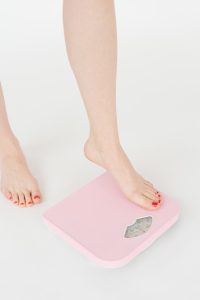 We all know that sinking feeling when you are sure you’ve lost a lot of weight, but instead that needle doesn’t budge off last week’s previous weight, or even worse, goes higher. That’s because scales lie. That’s right. They don’t always show that your efforts actually paid off and you are making real progress. How can that be? There are a lot of reasons this happens. People who weigh in daily often face this, but it’s due to temporary fluctuations from water weight gain.
We all know that sinking feeling when you are sure you’ve lost a lot of weight, but instead that needle doesn’t budge off last week’s previous weight, or even worse, goes higher. That’s because scales lie. That’s right. They don’t always show that your efforts actually paid off and you are making real progress. How can that be? There are a lot of reasons this happens. People who weigh in daily often face this, but it’s due to temporary fluctuations from water weight gain.
Don’t stop working out when you read this.
People who never exercised before often experience weight gain initially. The same can happen if you’ve kicked your workout into a higher intensity level. Before you give up exercise, read on. The reason is just temporary. The increased exercise stresses muscle tissue, causing micro tears. That increases inflammation. Inflammation can cause water retention, which means increased weight. The phenomena will disappear quickly, since it’s just temporary and part of the process of healing. If you lost a lot of weight initially and then is regained, it can be from glycogen loss, the energy stored in the muscles. Glycogen attaches to water, so when muscles are replenished, the weight returns.
It’s all about building muscle tissue.
Muscle tissue weighs more per cubic inch than fat tissue does. To put it another way, one pound of muscle tissue could fit in a much smaller container than a pound of fat tissue. It’s like the difference between a container holding a pound of iron, compared to one holding a pound of feathers. The one containing iron will be far smaller. That’s also true about your body. If you build more muscle tissue and lose fat, you may not see the results on the scales, but you’ll look thinner and wear a smaller size.
Sometimes, plateauing can occur.
You may be doing everything right, such as exercising regularly and sticking with a plan of healthy eating, sometimes you face a plateau or even weight gain. It might be hormonal differences, glycogen replenishment or simply from the fact your body is adjusting to your new weight, but your exercise program hasn’t. When you’re 40 pounds overweight, it’s like carrying two 20 pound weights everywhere you go. If you lose 20 pounds, you’ve lightened your load. You have to adjust your workout, since your body will be burning fewer calories.
- Find other ways besides the scales or in addition to the scales, to measure your progress. Take measurements or use another measurement related to your goal like how well your clothes fit.
- Use selfies to measure your progress. Make sure you wear the same clothes and take it in the exact same place so you have some perspective. Take a picture once a week. Compare them to ones taken a month previously.
- Make your goal relate to the reason you want to lose weight. Is it a health scare? Take your blood pressure at the same time each day. Record it or take a picture with your phone to log it, since it records the date.
- Measure your endurance and energy. Time yourself on a particular task that requires physical exertion, like climbing a flight of stairs or simply run upstairs until you get winded and log how many more flights you can do as you get fitter.
For more information, contact us today at Prime Fitness Studio
